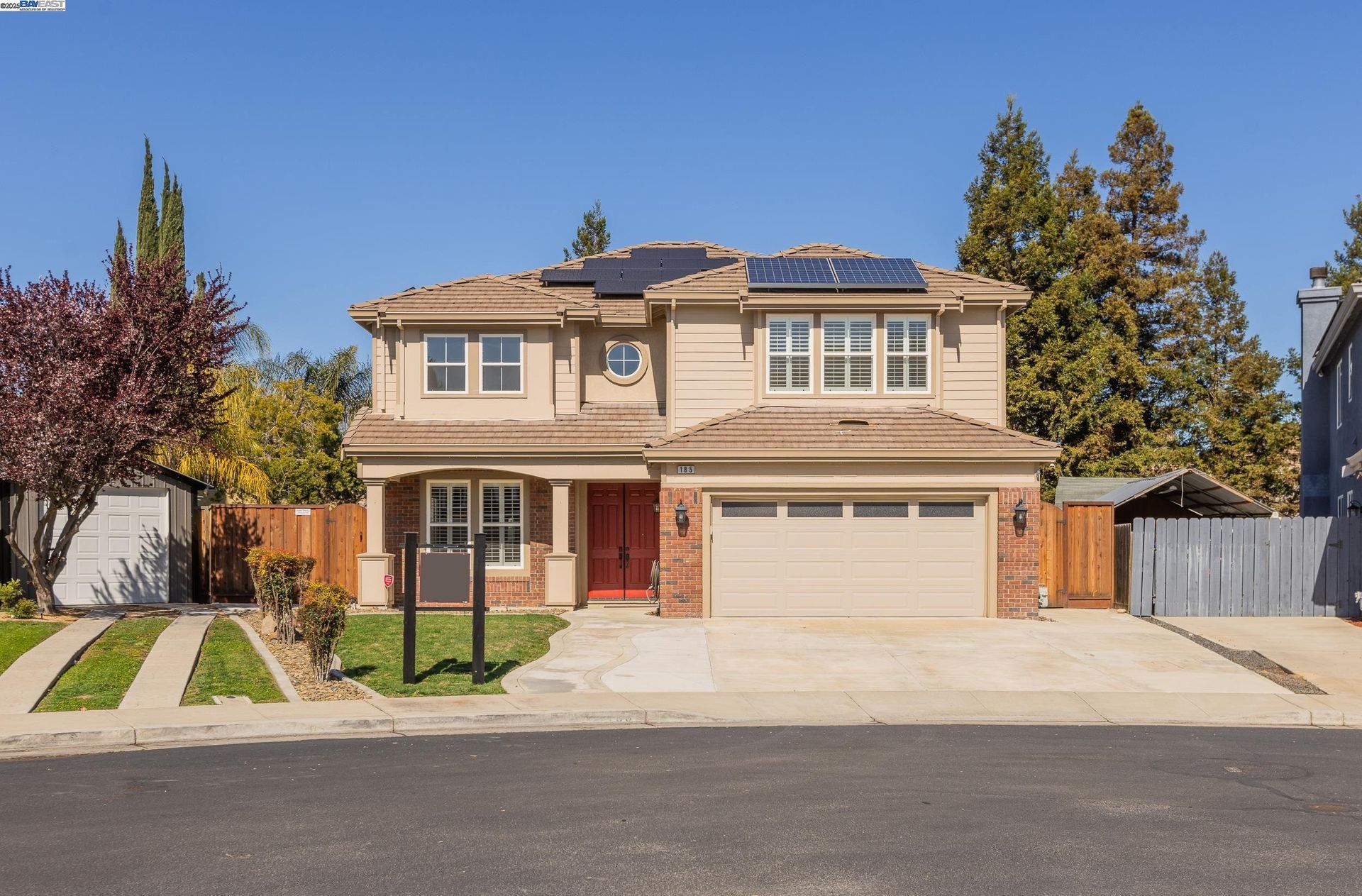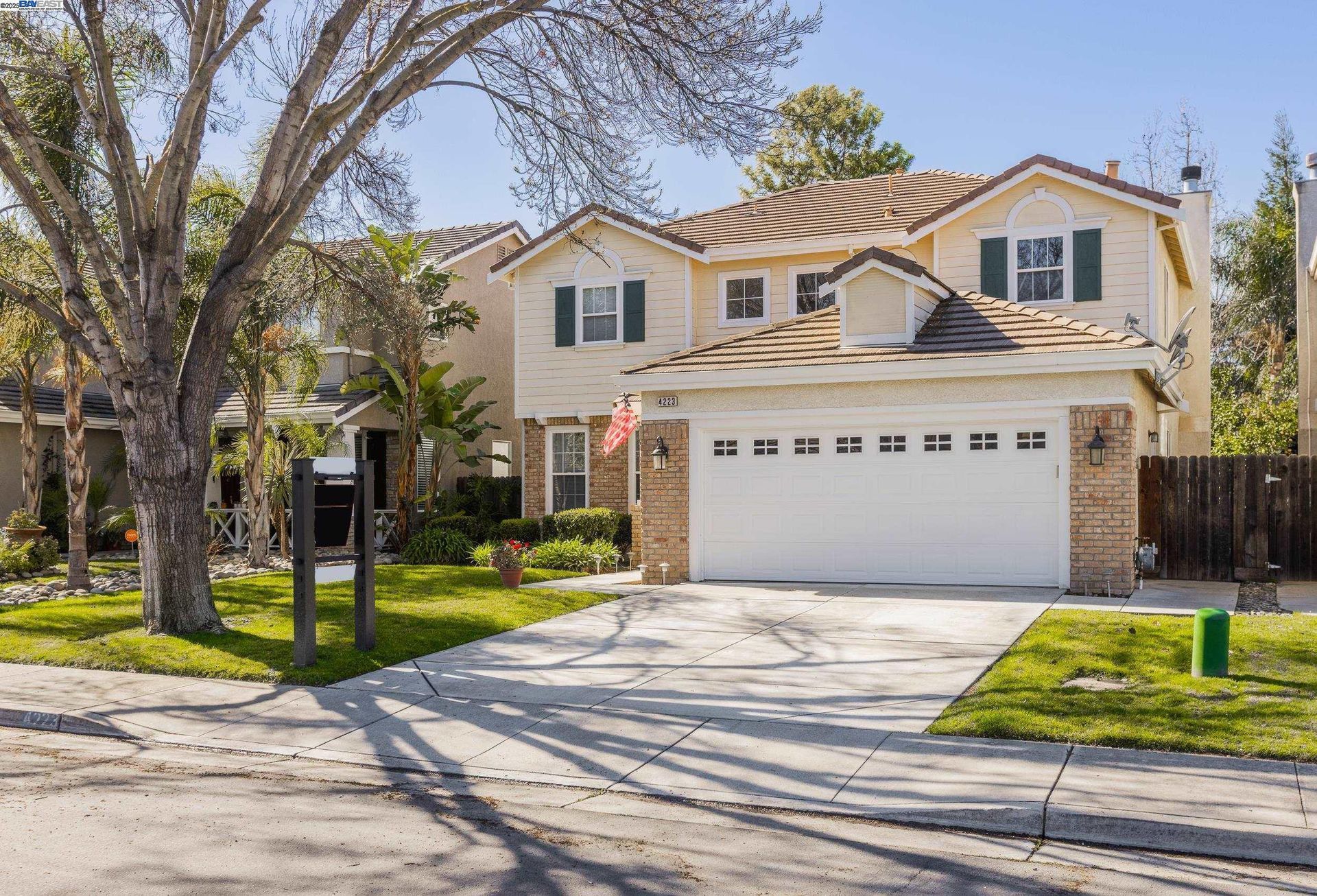By Arvid Abellera
•
April 2, 2025
Beautiful Tracy home features great curb appeal, The formal living & dining areas are bright & spacious with dark brown plank flooring. Gourmet Kitchen featuring plenty of cabinet space, tile granite counters, shiny black appliances and recessed lighting. Family room off the kitchen with a fireplace to enjoy in these chilly evenings, Surround yourself with lined trees covering a landscaped backyard with patio, it is perfect for get togethers or relaxing. The master suite features 2 walk-in closets & separate tub & shower. Close to Raley's shopping center, Tom Hawkins school and parks. Come see soon! 📍 4223 Lindsey Ln, Tracy, CA 95377 4 beds | 3 baths | 2,447 sqft | 6,250 sqft lot View Listing 🏡 https://davidazimi.realscout.com/homesearch/listings/149274234 YouTube Link: https://youtu.be/2EhacnfUv9E Website Link: https://www.davidazimigroup.com/4223-lindsey-ln-tracy-ca-95377 Other Properties: - 2254 Reserve Dr., Brentwood, CA YouTube Link: https://youtu.be/MVDmkmqDMME Website Link: https://www.davidazimigroup.com/2254-reserve-dr-brentwood-ca - 236 Elworthy Ranch Dr., Danville, CA YouTube Link: https://youtu.be/UXd5zYB06WM Website Link: http://www.davidazimigroup.com/236-elworthy-ranch-dr-danville-ca - 35882 Rockland Court, Fremont, CA YouTube Link: https://youtu.be/xug-Fm9h590 Website Link: http://www.davidazimigroup.com/35882-rockland-court-fremont-ca-94536 - 17356 Esteban St Hayward, CA 94541 YouTube Link: https://youtu.be/waCKhjcWAt0 Website Link: http://www.davidazimigroup.com/17356-esteban-st-hayward-ca-94541 - 306 Nita Ave Mountain View, CA 94043 YouTube Link: https://youtu.be/u7JGsp8YD3 Website Link: http://www.davidazimigroup.com/306-nita-ave-mountain-view-ca-94043 - 412 Royce Dr San Jose, CA 95133 YouTube Link: https://youtu.be/1rr-Wqi4mJY Website Link: http://www.davidazimigroup.com/412-royce-dr-san-jose-ca-95133 - 1135 DESMOND CT FREMONT, CA 94539 YouTube Link: https://youtu.be/CVg4of2qFb8 Website Link: http://www.davidazimigroup.com/1135-desmond-ct-fremont-ca-94539 - 75 Lansing St, 2 San Francisco, CA 94105 YouTube Link: https://youtu.be/KOWw2M5T_mo Website Link: http://www.davidazimigroup.com/75-lansing-st-2-san-francisco-ca-94105 - 1651 Cunningham St, Santa Clara, CA 95050 YouTube Link: https://youtu.be/3Nxr1mre45E Website Link: http://www.davidazimigroup.com/1651-cunningham-st-santa-clara-ca-95050 - 3080 Rocket Dr, Fremont, CA 94538 YouTube Link: https://youtu.be/acbV1sSBqro Website Link: http://www.davidazimigroup.com/3080-rocket-dr-fremont-ca-94538 - 1540 165th Ave, San Leandro, CA YouTube Link: https://youtu.be/2BRrK7Uzd5I Website Link: http://www.davidazimigroup.com/1540-165th-ave-san-leandro-ca-94578 - 1489 Bridge St, Concord, CA YouTube Link: https://youtu.be/6G6OcbX_0oA Website Link: http://www.davidazimigroup.com/1489-bridge-st-concord-ca-94518 - 209 Sunnyhills Court, Milpitas CA YouTube Link: https://youtu.be/TB60i5G47ns Website Link: http://www.davidazimigroup.com/209-sunnyhills-court-milpitas-ca-95035 - 4025 Moss Rock CT, Modesto, CA YouTube Link: https://youtu.be/x_nLxLqWsso Website Link: http://www.davidazimigroup.com/4025-moss-rock-ct-modesto-ca-95356 - 25129 Pleasant Way, Hayward, CA YouTube Link: https://youtu.be/ZbM1Wct5J-c Website Link: http://www.davidazimigroup.com/25129-pleasant-way-hayward-ca-94544 - 1000 3rd St Unit 1106, San Francisco, CA 94158 YouTube Link: https://youtu.be/OqZMTnfJV6E Website Link: http://www.davidazimigroup.com/1000-3rd-st-unit-1106-san-francisco-ca-94158 - 4181 Observatory Ave, Oakland, CA 94619 YouTube Link: https://youtu.be/Uuh7V44_Lhk Website Link: http://www.davidazimigroup.com/4181-observatory-ave-oakland-ca-94619 - 1758 Curtner Ave, San Jose, CA 95124 YouTube Link: https://youtu.be/bi_kDkg6Zas Website Link: http://www.davidazimigroup.com/1758-curtner-ave-san-jose-ca-95124 - 5763 Jensen Rd, Castro Valley, CA 94552 YouTube Link: https://youtu.be/ARkuCX5Cgdk Website Link: http://www.davidazimigroup.com/5763-jensen-rd-castro-valley-ca-94552 - 2863 S Bascom Ave, 812 Campbell, CA 95008 YouTube Link: https://youtu.be/JvHmrL1elJU Website Link: http://www.davidazimigroup.com/2863-s-bascom-ave-812-campbell-ca-95008 - 2371 Virginia St, 2 Berkeley, CA 94709 YouTube Link: https://youtu.be/-OlkKt05C6g Website Link: http://www.davidazimigroup.com/2371-virginia-st-2-berkeley-ca-94709 - 4089 Crandall Cir, Santa Clara, CA 9505 YouTube Link: https://youtu.be/6d7TGN5--yw Website Link: http://www.davidazimigroup.com/4089-crandall-cir-santa-clara-ca-95054 - 4933 Ivyleaf Springs Rd, San Ramon, CA 94582 YouTube Link: https://youtu.be/zmYZAXL_P7g Website Link: http://www.davidazimigroup.com/4933-ivyleaf-springs-rd-san-ramon-ca-94582 - 3119 Castle Canyon Way, San Jose, CA 95135 YouTube Link: https://youtu.be/KY3fnVx9rO8 Website Link: http://www.davidazimigroup.com/3119-castle-canyon-way-san-jose-ca-95135 - 2018 Wellington Dr, Milpitas, CA 95035 YouTube Link: https://youtu.be/qisJlNqJau4 Website Link: http://www.davidazimigroup.com/2018-wellington-dr-milpitas-ca-95035 - 15585 Via Veneto, Morgan Hill, CA 95037 YouTube Link: https://youtu.be/-JrKQLUS1oI Website Link: http://www.davidazimigroup.com/15585-via-veneto-morgan-hill-ca-95037 - 3572 Levanto Way, Manteca, CA 95337 YouTube Link: https://youtu.be/RFK7h_gHCQE Website Link: http://www.davidazimigroup.com/3572-levanto-way-manteca-ca-95337 - 235 N 3rd St, Campbell, CA 95008 YouTube Link: https://youtu.be/JNK8Zsa73rk Website Link: http://www.davidazimigroup.com/235-n-3rd-st-campbell-ca-95008 - 455 Crescent St, 313Oakland, CA 94610 YouTube Link: https://youtu.be/j8t3ozLO8dI Website Link: http://www.davidazimigroup.com/455-crescent-st-313oakland-ca-94610 - 151 Regency Dr, Clayton, CA 94517 YouTube Link: https://youtu.be/2jp0p9JIA7k Website Link: http://www.davidazimigroup.com/151-regency-dr-clayton-ca-94517 - 55 Hunter Ranch Rd, Napa, CA 94558 YouTube Link: https://youtu.be/l0JZ2kpyUd0 Website Link: http://www.davidazimigroup.com/55-hunter-ranch-rd-napa-ca-94558 - 38555 Overacker Ave, Fremont, CA 94536 YouTube Link: https://youtu.be/V-fMj7aIzG4 Website Link: http://www.davidazimigroup.com/38555-overacker-ave-fremont-ca-94536 - 1310-1340 Homestead Rd, Santa Clara, CA 95050 YouTube Link: https://youtu.be/Hfv0qxYOiAA Website Link: http://www.davidazimigroup.com/1310-1340-homestead-rd-santa-clara-ca-95050 - 518 44Th St, Oakland, CA 94609 YouTube Link: https://youtu.be/uM65b2pCT44 Website Link: http://www.davidazimigroup.com/518-44th-st-oakland-ca-94609 - 534 Montori Ct, Pleasanton, CA 94566 YouTube Link: https://youtu.be/gQFCKgNIqAI Website Link: http://www.davidazimigroup.com/534-montori-ct-pleasanton-ca-94566 - 932 Cherrystone Dr, Los Gatos, CA 95032 YouTube Link: https://www.youtube.com/watch?v=WGrQJOinpkE Website Link: http://www.davidazimigroup.com/932-cherrystone-dr-los-gatos-ca-95032 - 4143 Cheeney St, Santa Clara, CA 95054 YouTube Link: https://youtu.be/8RUYpvV4fM8 Website Link: http://www.davidazimigroup.com/4143-cheeney-st-santa-clara-ca-95054 - 2307 Solace Loop, San Jose, CA 95122 YouTube Link: https://youtu.be/zywiYg6Nz6Y Website Link: http://www.davidazimigroup.com/my-post6f4a84d2 - 1965 Ascot Dr, 6 Moraga, CA 94556 YouTube Link: https://youtu.be/tP17WD8HHm0 Website Link: http://www.davidazimigroup.com/1965-ascot-dr-6-moraga-ca-94556 - 9725 Alcosta Blvd, San Ramon, CA 94583 YouTube Link: https://www.youtube.com/watch?v=j2nibB3D7Vo Website Link: http://www.davidazimigroup.com/9725-alcosta-blvd-san-ramon-ca-94583 - 627 El Centro Rd, El Sobrante, CA 94803 YouTube Link: https://youtube.com/shorts/Kq6DSqaLz24 Website Link: http://www.davidazimigroup.com/627-el-centro-rd-el-sobrante-ca-94803 - 4836 Appian Way, El Sobrante, CA 94803 YouTube Link: https://youtu.be/aWUlCKUpu6s Website Link: http://www.davidazimigroup.com/4836-appian-way-el-sobrante-ca-94803 - 6246 Joaquin Murieta Ave, B Newark, CA 94560 YouTube Link: https://youtu.be/crCgLZcvMig Website Link: http://www.davidazimigroup.com/6246-joaquin-murieta-ave-b-newark-ca-94560 - 1450 Mount Shasta Ave, Milpitas, CA 95035 YouTube Link: https://youtu.be/MFHUlxxF0pY Website Link: http://www.davidazimigroup.com/1450-mount-shasta-ave-milpitas-ca-95035 - 3231 Carpenter Way, San Ramon, CA 94582 YouTube Link: https://youtu.be/ilfe14EjI94 Website Link: http://www.davidazimigroup.com/3231-carpenter-way-san-ramon-ca-94582 - 16389 Saratoga St, 305E, San Leandro, CA 9457 YouTube Link: https://youtu.be/iDNV4irZrnI Website Link: http://www.davidazimigroup.com/16389-saratoga-st-305e-san-leandro-ca-94578 - 1099 Country Club Dr, Lafayette, CA 94549 YouTube Link: https://youtu.be/RZrl9zNLrrc Website Link: http://www.davidazimigroup.com/1099-country-club-dr-lafayette-ca-94549 - 256 Element Rd, San Jose, CA 95110 YouTube Link: https://youtu.be/-R8AdoYtBfQ Website Link: https://www.davidazimigroup.com/256-element-rd-san-jose-ca-95110 - 51 Bay View Dr, San Carlos, CA 94070 YouTube Link: https://youtu.be/ofeLUVHcUzA Website Link: http://www.davidazimigroup.com/51-bay-view-dr-san-carlos-ca-94070 - 4653 Beaumont Ave, Tracy, CA 95377 YouTube Link: https://youtu.be/ZWIGW7y6A00 Website Link: https://www.davidazimigroup.com/4653-beaumont-ave-tracy-ca-95377 - 30 Terraced Hills Way, San Ramon, CA 94583 YouTube Link: https://youtu.be/CNHtoJjk5mc Website Link: https://www.davidazimigroup.com/30-terraced-hills-way-san-ramon-ca-94583 - 1775 Heron Ave, Sunnyvale, CA 94087 YouTube Link: https://youtu.be/_CZcEDGIg_g Website Link: http://www.davidazimigroup.com/1775-heron-ave-sunnyvale-ca-94087 - 39668 Banyan Tree Rd, Fremont, CA 94538 YouTube Link: https://youtu.be/osKCXJvAReE Website Link: http://www.davidazimigroup.com/39668-banyan-tree-rd-fremont-ca-94538 - 4316 Bidwell Dr, Fremont, CA 94538 YouTube Link: https://youtu.be/KtbVP6bNioc Website Link: http://www.davidazimigroup.com/4316-bidwell-dr-fremont-ca-94538 - 42011 Meredith Dr, Fremont, CA 94539 YouTube Link: https://youtu.be/KXsmvHlOWIw Website Link: https://www.davidazimigroup.com/42011-meredith-dr-fremont-ca-94539 - 3367 Esperanza Dr, Concord, CA 94519 YouTube Link: https://youtu.be/lUuP3eF3IUQ Website Link: https://www.davidazimigroup.com/3367-esperanza-dr-concord-ca-94519 - 257 Arlington Rd, 203, Redwood City, CA 94062 YouTube Link: https://youtu.be/BHPFFvvDehM Website Link: http://www.davidazimigroup.com/257-arlington-rd-203-redwood-city-ca-94062 - 1683 Marina Way, Brentwood, CA 94513 YouTube Link: https://youtu.be/6_EXo26c3Z0 Website Link: https://www.davidazimigroup.com/1683-marina-way-brentwood-ca-94513 - 38321 Timpanogas Cir, Fremont, CA 94536 YouTube Link: https://youtu.be/952aqbnXyWM Website Link: http://www.davidazimigroup.com/38321-timpanogas-cir-fremont-ca-94536 - 537 Morningstar Way, Vacaville, CA 95687 YouTube Link: https://youtu.be/aCJn-BZLBRs Website Link: http://www.davidazimigroup.com/537-morningstar-way-vacaville-ca-95687 - 1036 Bret Hill Ct, San Jose, CA 95120 YouTube Link: https://youtu.be/9rokUNO6fxA Website Link: http://www.davidazimigroup.com/1036-bret-hill-ct-san-jose-ca-95120 - 2 Windmill Ct, San Ramon, CA 94583 YouTube Link: https://youtu.be/7bNEWlzGNm0 Website Link: http://www.davidazimigroup.com/2-windmill-ct-san-ramon-ca-94583 - 5373 San Simeon Pl, Castro Valley, CA 94552 YouTube Link: https://youtu.be/J_TtgxkMaWw Website Link: http://www.davidazimigroup.com/5373-san-simeon-pl-castro-valley-ca-94552 - 16431 Saratoga St, 206w, San Leandro, CA 94578 YouTube Link: https://youtu.be/Q8WSa9H5vo0 Website Link: http://www.davidazimigroup.com/16431-saratoga-st-206w-san-leandro-ca-94578 - 1314 4th St, Berkeley, CA 94710 YouTube Link: https://youtu.be/jkmmI-zqHUo Website Link: https://sites.liftoffagent.com/home/site/c3bc8d29/blog/1314-4th-st-berkeley-ca-94710 - 817 Horcajo St, Milpitas, CA 95035 YouTube Link: https://youtu.be/2mmeny5DTzM Website Link: http://www.davidazimigroup.com/817-horcajo-st-milpitas-ca-95035 - 373 Taurus Ave, Oakland, CA 94611 YouTube Link: https://youtu.be/QBcbwc3NtCA Website Link: http://www.davidazimigroup.com/373-taurus-ave-oakland-ca-94611 - 35267 Farnham Dr, Newark, CA 94560⠀ YouTube Link: https://youtu.be/FRwr98uLrWU Website Link: http://www.davidazimigroup.com/35267-farnham-dr-newark-ca-94560 - 676-680 Colorado Ave, Palo Alto, CA 94306 YouTube Link: https://youtu.be/f0fWkJj3oCU Website Link: http://www.davidazimigroup.com/676-680-colorado-ave-palo-alto-ca-94306 - 965 Ascot Dr, 6, Moraga, CA 94556⠀ YouTube Link: https://youtu.be/kECwQ524HYM Website Link: http://www.davidazimigroup.com/my-poste8edd823 - 2912 Rugby Ct, Tracy, CA 95377⠀ YouTube Link: https://youtu.be/SdInLk26hVQ Website Link: https://www.davidazimigroup.com/2912-rugby-ct-tracy-ca-95377 - 1507 48Th Ave, Oakland, CA 94601⠀ YouTube Link: https://youtu.be/zbyJsAW9zZ0 Website Link: https://www.davidazimigroup.com/1507-48th-ave-oakland-ca-94601 - 2906 Morgan Dr, San Ramon, CA 94583 YouTube Link: https://youtu.be/qG69shRLaOg Website Link: https://www.davidazimigroup.com/2906-morgan-dr-san-ramon-ca-94583 INTERO Real Estate | It takes: Discipline, Routine, Education, Action, Mentality to turn DREAMS into reality. David Azimi | Realtor® CA DRE# 01790940 📲 510.386.4844 📧 info@davidazimigroup.com 🌐 www.davidazimigroup.com Looking to Buy Your First Home? ⭐ https://www.davidazimigroup.com/first-time-home-buyer Set Up Property Alerts ⭐ https://www.davidazimigroup.com/setup-property-alerts #TheDavidAzimiGroup #Intero #TopAgent #EastBay #SiliconValley #RealEstateExpert #Tracy#LivingInTracy














